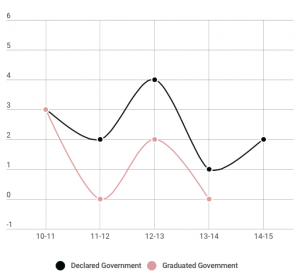
Government faculty and students were shocked to find their department affected by the proposed curriculum cuts announced in President Alecia DeCoudreaux’s memorandum sent out on Oct. 19.
Due to the low number of declared students in the government and international relations majors, the administration proposed changing those majors into concentrations and incorporating them under the political, legal, economic analysis (PLEA) major. Although faculty and students were not as surprised to see proposed changes for the government major, they were upset to find international relations on the list.
According to Interim Provost Sharon Washington, if the new curriculum changes are implemented in Fall 2016, students who plan to declare a major in PLEA will have to choose a concentration in either public policy, international relations, government, law or economics.
“We are really trying to determine how to increase greater flexibility for students to be able to have concentrations because I think that its always preferred by colleges in general to still have a broad range of areas to study,” Washington said. “They may become concentrations in more broad interdisciplinary majors.”
Prior to the memorandum, government professor Fred Lawson, was prepared to see changes made in the government major. Over the years, the government major has not attracted enough declared students, ranking second to last of declared majors and performing in the 8 percentile, according to Mills College: Facts and Trends for 2014 to 2015. However, when the administration announced majors that would turn into concentrations, Lawson was caught off guard to find the international relations major put on the list.
“The administration was looking at majors that had low numbers of declared people in them and government does fit in that category, although international relations does not,” Lawson said.
Lawson says that there are only three students declared in the government major, while there are 17 students who are declared in international relations. The amount of declared international relations students is considered a relatively high amount for a small department. According to Mills College: Facts and Trends for 2014 to 2015, international relations is the 12th largest major out of 36 majors at Mills (including undeclared students) and performs in the 68 percentile.
The public policy major, with 15 declared students, is the 15th largest major and performs in the 61 percentile. The PLEA major is ranked the sixth largest major on campus and performs in the 86 percentile.
According to the Austen Group — hired by the college to access the budget — both the international relations and government majors operate “in the black,” meaning that the expenses of the government department are outweighed by the revenue of government department courses. The government department attracts enough interested students and majors so that student tuition covers the cost of government faculty.
“The basis of all these changes isn’t that the administration hates these programs, but rather which programs can actually pull their weight financially,” Lawson said.
Although government students were not as surprised to see changes to the government major, students were shocked to find international relations included on the list for curriculum changes. Deellan Kashani, a senior international relations major, believes that it is unfair to make drastic changes to a department that consistently produces many qualified and ambitious graduates into the political science field.
“I think the current administration is proposing changes that clearly show a lack of understanding about what a liberal arts education looks like; the proposed centralization and merging of unique areas of study will further confuse potential students and potential graduate schools when students later apply,” Kashani said via email.
A week before the second open forum regarding the curriculum changes on Oct. 28, a group of government department students discussed their concerns about incorporating the department’s major courses under the PLEA umbrella major.
International relations and Spanish double major Beatrice Waterhouse spoke on behalf of the government department during the open forum in an effort to voice the concerns that government department students have about the proposed curriculum changes. Waterhouse notes that government students primarily wanted “to keep international relations as a separate major” from the proposed PLEA umbrella major.
In an effort to salvage the international relations major, Lawson and Assistant Government Professor Martha Johnson have designed a new proposal to keep the major independent from the PLEA program.
“We think international relations is not only a good recruiting mechanism, but we think [international relations] majors learn something and go on to do interesting things,” Lawson said.
If the international relations major is approved to stay separate from the newly designed PLEA program, then there will be fewer course choices. Rather than teaching two Middle East-oriented courses, Lawson would teach only one in a semester; the same would go for Johnson’s courses. In addition, both Lawson and Johnson would also contribute in the government sectors areas of the new PLEA program.
“Our goal is to have students not notice change unless in a positive way,” Lawson said.
The administration wants a number of changes and proposals from the departments, including government, by Thanksgiving break for a budget presentation to the Board of Trustees. In early December, the Board will vote on whether or not changes will be made to the curriculum.
Additional reporting done by Emily Mibach.





